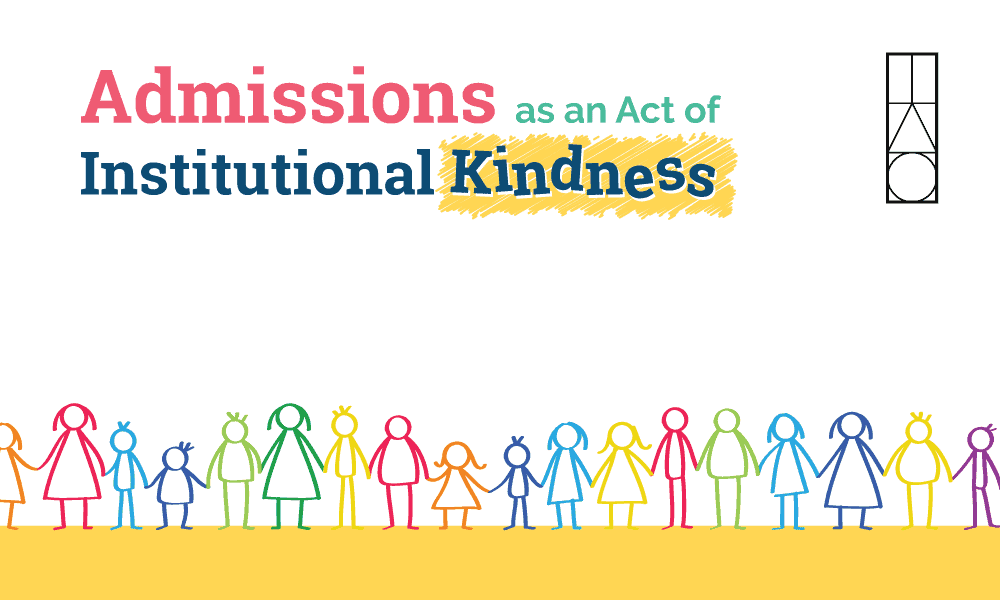In a recent blog, David Willows suggested that school admissions was an act of “institutional kindness”. Cristina Willows now adds to this conversation by describing what this might actually look like in practice.
Western philosophy has tended to be silent on the subject of kindness. So, whilst Aristotle once famously defined this virtue as an act of helping someone in need without looking for anything in return, the West has tended to look down upon or simply ignore its importance in any discussion of “the good life”. The idea of kindness was simply too “soft” and stood in stark contrast to the rhetoric of duty, virtue and the responsibility of the rational mind.
Within the Buddhist tradition, however, there is a rich vocabulary around the idea of kindness. It speaks to us of the value of muducittata, the state of having a tender mind. Confucian education, likewise, encourages us to pursue the idea of intelligent kindness. Much more than simply being “nice” to people, it points to a virtue that can be mastered only through practice, cultivation and discipline.
In recent times, it has been interesting to see the language of kindness return to some corners of the political arena, perhaps because of the way it offers a powerful antidote to the narcissism of our geopolitical age.
Rather than take us deeper into philosophy or politics, however, let us perhaps simply consider the possibility that admissions, in its most noble form, is an expression of personal and institutional kindness.
Learning the art of institutional kindness, for me at least, is about together becoming a community that is generous, giving without wanting anything in return; a community that is inclusive, embracing those who are different; a community that is radically open, listening first and speaking later; and, finally, a community that is attentive, making each individual feel at once connected and unique.
It was the French philosopher and social activist, Simone Weil, who once wrote that “Attention is the rarest and purest form of generosity.”
I believe that the schools that do admissions best are those that are generous in this way.
At the same time, I fear that this is an art that only a few of us have mastered.
Snapshots of kindness
It was Maya Angelou who taught us that “people will forget what you said, people will forget what you did, but people will never forget how you made them feel.”
As someone who has worked in admissions for several years now, I know all too well that almost everything I’ve said or done has been forgotten.
But I also know that, when things have gone well, it has often been linked to a feeling that a family has left with after visiting my school.
Whether it is specifically a feeling of “kindness” that families feel, I don’t know. Feelings are complex, messy and often hard to discern precisely one from another.
Giving priority to how we make people feel, in contrast to what we make them think, has been something that I focused on for several years now.
Here are five anecdotes – snapshots – of what that looks like from my small corner of Brussels.
I’ve learned over time that those of us in admissions love our routines. Most of us have a particular way of running an interview and tour. Sometimes, though, that just doesn’t work for a family. So, I’m learning to stop and ask myself, right from the start, What does this family need right now? Do they need to sit in an office and ask questions or would they be better off talking informally while their children play in the playground?
Kindness is… suspending judgement
Almost every day, we meet people with different backgrounds and experiences. Each family has a unique story, a unique way of seeing the world, and a unique sense of what good education looks like. Over time, I have trained myself to take a step back, listen, and remain open to other perspectives. I try to suspend judgement and always put myself in the shoes of a family trying to manage a transition. How important it is, I am learning, to give families “the benefit of the doubt” and not always trust my first impressions.
Kindness is… telling the truth
School admissions bridges the worlds of marketing and finding the best fit for a child. As such, kindness is not always about saying what a family wants to hear. It is about telling the truth and being the voice of reality. Undiluted truth, however, can be a bitter pill to swallow. So, I often find myself asking, How can I share bad news in a way that demonstrates understanding? How do I encourage without over promising? Finding words that are both true and comforting is the balance that I find kindness demands of us.
Kindness is… remembering to say thank you
When a family recommends the school to a visiting family, it reminds us of the importance of word of mouth. I don’t take this for granted and also contact the family that put in a good word, thanking them for their positive recommendation.
Kindness is… passing on the love
During the admissions visit, parents will often have positive comments about teachers that they meet. Others will pass on things that they heard anecdotally from former parents or students. I always take time pass on every kind word that is shared.
















 All Services
All Services


